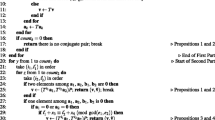Abstract
The output sequence of a binary linear feedback shift register with k taps corresponds to a polynomial \(f(x) = 1+x^{{a}_{1}}+x^{{a}_{2}}+...+x^{{a}_{k}}\), where the exponents a 1, a 2, ..., a k = n are the positions of the taps, and n, the degree of f(x), is the length of the shift register. Different initial states of the shift register may give rise to different output sequences. The simplest shift registers to implement involve only two taps (k = 2). It is therefore of interest to know which irreducible polynomials f(x) divide trinomials, over GF(2), since the output sequences corresponding to f(x) can be obtained from a two-tap linear shift register (with a suitable initial state) if and only if f(x) divides some trinomial t(x) = x m + x a + 1 over GF(2). In this paper we develop the theory of which irreducible polynomials over GF(2) do, or do not, divide trinomials.
Preview
Unable to display preview. Download preview PDF.
Similar content being viewed by others
References
Golomb, S.W.: Shift Register Sequences. Holden-Day, Inc. (1967); Second edn., Aegean Park Press (1982)
Zierler, N., Brillhart, J.: On Primitive Trinomials (mod 2). Information and Control 13, 541–554 (1968)
Zierler, N., Brillhart, J.: On Primitive Trinomials (mod 2) II. Information and Control 14, 566–569 (1969)
Seroussi, G.: Table of Low-Weight Binary Irreducible Polynomials, Computer Systems Laboratory, HPL-98-135 (1998)
Swan, R.G.: Factorization of Polynomials over Finite Fields. Pacific J. Mathematics 12, 1099–1106 (1962)
Brent, R.P., Zimmermann, P.: Algorithms for Finding Almost Irreducible and Almost Primitive Trinomials. In: Proceedings of a Conference in Honor of Professor H.C. Williams, The Fields Institute (May 2003)
Lindholm, J.H.: An Analysis of the Pseudo-Randomness Properties of Subsequences of Long m-Sequences. IEEE Transactions on Information Theory IT-14(4), 569–576 (1968)
Hooley, C.: Artin’s conjecture for primitive roots. J. Reine Angew. Math. 225, 209–220 (1967)
Brillhart, J., Lehmer, D.H., Selfridge, J.L., Tuckerman, B., Wagstaff Jr., S.S.: Factorizations of b n±1(b = 2, 3, 5, 6, 7, 10, 11, 12) up to high powers, Contemporary Mathematics, 3rd edn., vol. 22. American Math. Soc., Providence (2003)
Author information
Authors and Affiliations
Editor information
Editors and Affiliations
Rights and permissions
Copyright information
© 2005 Springer-Verlag Berlin Heidelberg
About this paper
Cite this paper
Golomb, S.W., Lee, PF. (2005). Which Irreducible Polynomials Divide Trinomials over GF(2)?. In: Helleseth, T., Sarwate, D., Song, HY., Yang, K. (eds) Sequences and Their Applications - SETA 2004. SETA 2004. Lecture Notes in Computer Science, vol 3486. Springer, Berlin, Heidelberg. https://doi.org/10.1007/11423461_32
Download citation
DOI: https://doi.org/10.1007/11423461_32
Publisher Name: Springer, Berlin, Heidelberg
Print ISBN: 978-3-540-26084-4
Online ISBN: 978-3-540-32048-7
eBook Packages: Computer ScienceComputer Science (R0)




